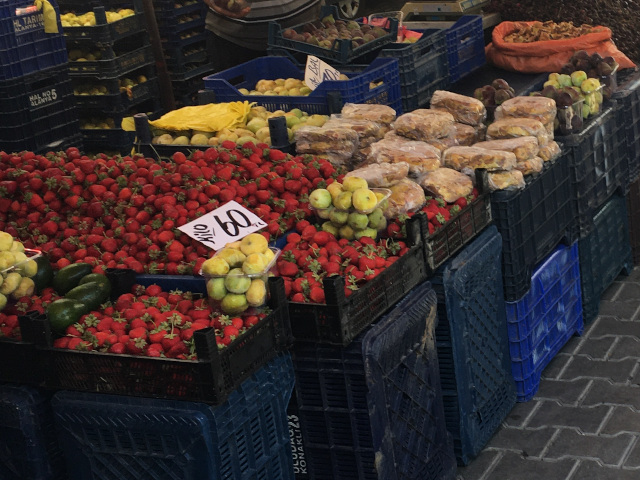
THE BAZAAR IN KONAKLI
Market in Konakli
/ / Travel Reports / Turkey 2023 / The Bazaar in Konakli
Bazaars are among the most sought-after Turkish traditions. In every city and almost every village, there is a Bazaar. They usually take place at least once a week and last from morning till evening. Besides enjoying a pleasant stroll amidst a wide array of colors and scents, one can listen to customers haggling with vendors. The Bazaar is an ideal place to buy spices, raisins, nuts, and souvenirs. In Konakli, the Bazaar is held once a week, on Wednesdays, from 9:00 AM to 6:00 PM. It is located at the Konakli Medical Centre and on Vatan Caddesi street. Goods are sold here for both tourists and local residents. The assortment includes fruits and vegetables, spices, tea, household items, clothing, footwear, and souvenirs. If traveling by bus from Alanya, it is ideal to disembark near the clock tower. The Bazaar is just a short distance further. Vatan Caddesi street runs parallel to the D400 highway, along which the bus travels. We stopped at the Bazaar during our visit to Konakli.
Negotiating the price is an integral part of the Turkish Bazaar experience. The price initially stated is not the final price. It is usually two to three times higher than the price the vendor is willing to sell for. When bargaining, it's essential to start with a price lower than what we're willing to pay for the item. The beauty of haggling lies in the seller lowering the price while the buyer increases it. Ideally, the seller's price drop should be quicker than the buyer's increase. At the end of the transaction, during which the buyer may leave several times and the seller may bring them back just as many times, both the buyer and the seller are satisfied. The buyer is happy to have negotiated, and the seller is pleased to have earned more than expected. Negotiation doesn't occur in brick-and-mortar stores, supermarkets, or in the fruit and vegetable market. It's not done for items we don't intend to purchase. The best time for shopping is in the morning.




What to bring back from Turkey? Goods from textile and leather of world brands are sold there. They are not originals, but only imitations. The differences are minimal, and the prices are significantly lower. No one punishes their sale. The same applies to footwear. However, we had bad experiences with the quality of footwear in 2019. Besides advantageous purchases of various clothing, cotton towels, bath towels, wallets, keychains, belts, bags, etc., jewelry made of gold and silver can also be purchased advantageously in Turkey. We recommend requesting a certificate of authenticity, checking the hallmark, and keeping the receipt. Many tourists bring carpets from Turkey. Kelim is a carpet made by tapestry technique. Hand-woven carpets are more expensive. They can be recognized by knots on the back. A carpet with more knots is more valuable. However, not everyone wants to travel home by air with a carpet.
Among the sought-after souvenirs are items made of copper and brass. These include various kettles, bowls, trays, candleholders, lamps, etc. The cezve, used for brewing Arabic or Turkish coffee, is popular. It has a conical shape and a long straight handle, decorated with embossed hammering. Official permission is required for the export of antique items. Ceramic products are also popular souvenirs. They became popular in the 15th century when the sultan became fond of blue and white Chinese ceramics. A popular design is the plant motif in olive green, grayish-green, or purple. Before getting enchanted, it's believed to be protected by an amulet in the form of a blue and white eye, symbolizing the eye of the prophet. If it breaks, it's believed to have averted evil. This "nazar," or "nazar boncugu," is a typical Turkish souvenir, sold in the form of keychains, brooches, or beads. Some vendors attach it as a thank-you for the purchase.




Turkey is one of the most significant exporters of spices. Turkish spices are of very high quality, giving dishes an original and distinctive taste and aroma. Some types of spices can only be bought at Turkish markets. Turkish tea is prepared in a double kettle called a çaydanlik and poured into small tulip-shaped glasses. We drank tea from those even at the Nox Inn Deluxe hotel. Another typical Turkish treat is the rich and sweet pastry Baklava. Besides the Bazaar, we also shopped at markets near our hotel. Compared to 2019, the vendors seemed more unpleasant, pushy, less willing to negotiate, and in some cases, even rude. There were, of course, exceptions. In the shops on the ground floor of the Algora hotel, we encountered a textile vendor who was the complete opposite - quiet, polite, and pleasant. Prices were fixed, and they were comparable to what could be obtained elsewhere after lengthy bargaining. The store was called Bella d' Ora.
Photo gallery: Konakli